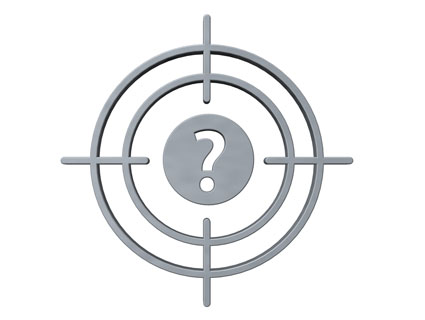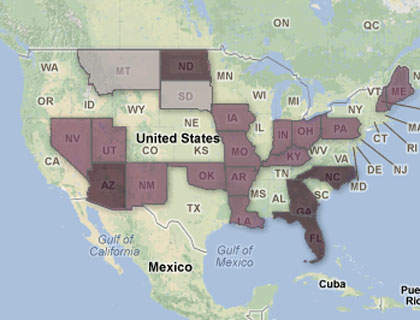
<a href="http://www.shutterstock.com/cat.mhtml?lang=en&search_source=search_form&version=llv1&anyorall=all&safesearch=1&searchterm=pile+of+guns&search_group=#id=52306210&src=BjIUavXrqxG4oUtog70D9A-1-71">Don Bendickson</a>/Shutterstock
Sens. Joe Manchin (D-W.Va.) and Pat Toomey (R-Pa.) have been forced this week to consider further retooling their bill for expanded gun background checks, which Senate Majority Leader Harry Reid told reporters on Tuesday still lacks the 60 votes it needs to overcome a filibuster. The National Rifle Association and senators opposed to the bill continue to argue that it would unfairly burden lawful gun owners while doing nothing to prevent future tragedies like the one in Newtown.
In fact, the bill does an awful lot that should please the pro-gun lobby. Which helps explain why, on Sunday, the gun-rights group Citizens Committee for the Right to Keep and Bear Arms endorsed the bill and the “numerous advances for our Constitutional right to keep and bear arms that it contains.” (Even the NRA, consulted during the compromise talks, initially called the bill a “positive development,” as opposed to the stricter gun-control plan initially proposed by Sen. Chuck Schumer; the NRA later backtracked, saying the compromise bill would violate the Second Amendment.)
So, how much would the Manchin-Toomey bill actually expand gun rights? Quite a bit, in its current form. While broadening background checks to some degree, the bill also:
- Exempts many sales from background checks: The bill doesn’t alter current laws exempting background checks for gun transfers between friends and families. It also wouldn’t require checks for other private sales if the guns weren’t “advertised.” That weakens the effectiveness of background check reform in a big way: Nearly 80 percent of inmates arrested for handgun crimes got their gun from someone other than a licensed dealer, according to a recent Johns Hopkins survey (PDF).
- Leaves open a gun-show loophole: Because of the private sales exemption, the bill doesn’t entirely close the so-called gun-show loophole, as UCLA law professor Adam Winkler notes. Someone looking to buy a gun could find a private seller and “agree to meet after the show at a convenient location and make the sale, with no background check.”
- May exempt background checks in some rural areas: As part of their effort to woo rural senators, Manchin and Toomey may add a measure allowing dealers who live more than 100 miles away from a licensee to skip background checks.
- Exempts background checks for concealed-carry permit holders: Gun buyers who got a concealed-carry permit within the past five years wouldn’t have to undergo background checks for commercial sales.
- Reduces the time the FBI has to block a sale: Current law gives the FBI 72 business hours to block a sale by a licensed dealer at a gun show if the buyer’s background check is flagged. The bill would reduce that to 48 hours and, after four years, reduce it again to 24 hours. The FBI would still have to destroy information about the buyer’s identity within 24 hours after a sale.
- Allows the interstate sale of handguns: Currently, licensed dealers can only sell rifles and shotguns across state lines. The bill would expand that to include handguns. Licensed dealers would also be allowed to sell guns to other dealers at gun shows outside of their home state.
- Weakens laws that restrict transporting guns across state lines: The bill would establish a federal regulation protecting lawful gun owners from arrest when they cross state lines with their firearm, which would weaken laws in states with tighter state and local regulations.
- Expands legal immunity to private sellers: In 2005, Congress passed the Protection of Lawful Commerce in Arms Act, which prevents victims of gun violence from suing gun manufacturers and dealers for negligence. The Manchin-Toomey bill would expand that immunity to private gun sellers who don’t have a commercial license.
- Makes a national gun registry even less likely than before: Senators like Roy Blunt (R-Mo.) and Chuck Grassley (R-Iowa) are still warning that the bill is a step toward a national gun registry—even though it would punish people who try to create one with up to 15 years in prison. American Civil Liberties Union privacy lobbyist Chris Calabrese, who had concerns with Schumer’s bill, told the Washington Post that the Manchin-Toomey bill would strengthen the current law that has banned a registry since 1986.
- Expands gun rights for veterans in questionable condition: Current law prohibits veterans from buying guns if the Department of Veterans Affairs considers them “‘mentally incompetent’ to manage their own funds,” after which they are put into the national background check database. The Manchin-Toomey bill would allow veterans unfit to manage their funds to continue buying guns while they appealed the VA’s decision, and expand the ability of veterans already in the system to file appeals to have their name removed. It would also overturn a law that bans members of the military from buying guns sold by dealers in their home state.
Despite all this, some gun control groups are supporting the bill on account of its other measures, including giving states funding incentives to improve reporting of prohibited buyers to the National Instant Criminal Background Check System, and expanding record-keeping requirements for licensed dealers.
In support of the bill, Mayors Against Illegal Guns has targeted uncommitted senators with an ad campaign. Gabby Giffords’ group, Americans for Responsible Solutions, which supports universal background checks, launched a petition urging Congress to support the bill.
But other groups have been more reserved in their support. The Brady Campaign to Prevent Gun Violence supports the majority of the bill but expressed concern with its measures allowing interstate handgun sales, regulating interstate gun transportation, exempting concealed-carry permit holders from background checks, expanding sellers’ immunity from lawsuits, and limiting the time allowed to conduct gun-show background checks. Coalition to Stop Gun Violence spokesman Ladd Everitt expressed many of the same reservations with the bill’s “give and take,” but said it would be a step in the right direction. “It would have been a hell of a lot more dangerous if we weren’t regulating gun shows,” he said.
When Congress last passed background check legislation after the 2007 Virginia Tech massacre, gun control groups weren’t as supportive. The Violence Policy Center released a joint statement then with the Coalition to Stop Gun Violence and Legal Community Against Violence, saying the bill had been “hijacked by the gun lobby.” They criticized the bill for loosening record-keeping on the mentally ill—and for a measure similar to Manchin-Toomey’s proposal to restore veterans’ gun rights. (The Violence Policy Center, whose current efforts have focused on an assault weapons ban, didn’t respond to requests for comment about the Manchin-Toomey bill.)
The Senate plans to vote on the Manchin-Toomey compromise on Wednesday.
















